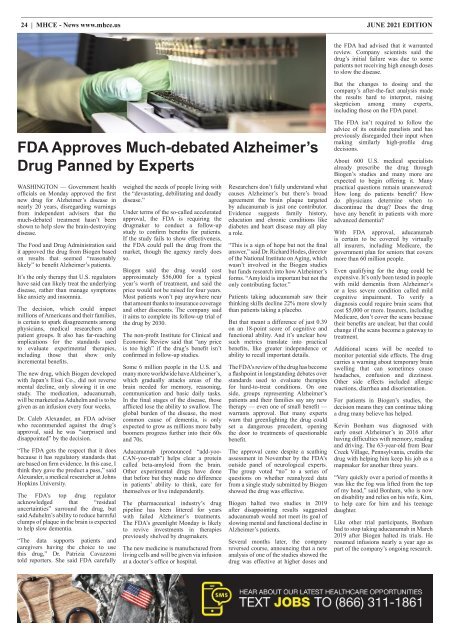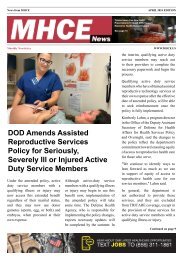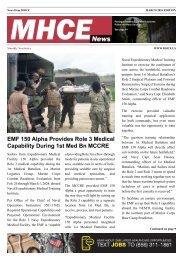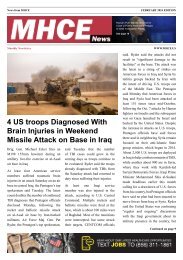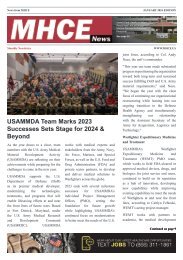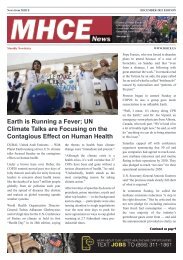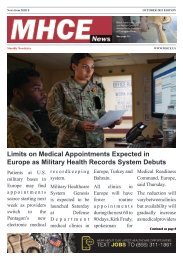June 2021 Newsletter
Create successful ePaper yourself
Turn your PDF publications into a flip-book with our unique Google optimized e-Paper software.
24 | MHCE - News www.mhce.us JUNE <strong>2021</strong> EDITION<br />
the FDA had advised that it warranted<br />
review. Company scientists said the<br />
drug’s initial failure was due to some<br />
patients not receiving high enough doses<br />
to slow the disease.<br />
But the changes to dosing and the<br />
company’s after-the-fact analysis made<br />
the results hard to interpret, raising<br />
skepticism among many experts,<br />
including those on the FDA panel.<br />
FDA Approves Much-debated Alzheimer’s<br />
Drug Panned by Experts<br />
WASHINGTON — Government health<br />
officials on Monday approved the first<br />
new drug for Alzheimer’s disease in<br />
nearly 20 years, disregarding warnings<br />
from independent advisers that the<br />
much-debated treatment hasn’t been<br />
shown to help slow the brain-destroying<br />
disease.<br />
The Food and Drug Administration said<br />
it approved the drug from Biogen based<br />
on results that seemed “reasonably<br />
likely” to benefit Alzheimer’s patients.<br />
It’s the only therapy that U.S. regulators<br />
have said can likely treat the underlying<br />
disease, rather than manage symptoms<br />
like anxiety and insomnia.<br />
The decision, which could impact<br />
millions of Americans and their families,<br />
is certain to spark disagreements among<br />
physicians, medical researchers and<br />
patient groups. It also has far-reaching<br />
implications for the standards used<br />
to evaluate experimental therapies,<br />
including those that show only<br />
incremental benefits.<br />
The new drug, which Biogen developed<br />
with Japan’s Eisai Co., did not reverse<br />
mental decline, only slowing it in one<br />
study. The medication, aducanumab,<br />
will be marketed as Aduhelm and is to be<br />
given as an infusion every four weeks.<br />
Dr. Caleb Alexander, an FDA adviser<br />
who recommended against the drug’s<br />
approval, said he was “surprised and<br />
disappointed” by the decision.<br />
“The FDA gets the respect that it does<br />
because it has regulatory standards that<br />
are based on firm evidence. In this case, I<br />
think they gave the product a pass,” said<br />
Alexander, a medical researcher at Johns<br />
Hopkins University.<br />
The FDA’s top drug regulator<br />
acknowledged that “residual<br />
uncertainties” surround the drug, but<br />
said Aduhelm’s ability to reduce harmful<br />
clumps of plaque in the brain is expected<br />
to help slow dementia.<br />
“The data supports patients and<br />
caregivers having the choice to use<br />
this drug,” Dr. Patrizia Cavazzoni<br />
told reporters. She said FDA carefully<br />
weighed the needs of people living with<br />
the “devastating, debilitating and deadly<br />
disease.”<br />
Under terms of the so-called accelerated<br />
approval, the FDA is requiring the<br />
drugmaker to conduct a follow-up<br />
study to confirm benefits for patients.<br />
If the study fails to show effectiveness,<br />
the FDA could pull the drug from the<br />
market, though the agency rarely does<br />
so.<br />
Biogen said the drug would cost<br />
approximately $56,000 for a typical<br />
year’s worth of treatment, and said the<br />
price would not be raised for four years.<br />
Most patients won’t pay anywhere near<br />
that amount thanks to insurance coverage<br />
and other discounts. The company said<br />
it aims to complete its follow-up trial of<br />
the drug by 2030.<br />
The non-profit Institute for Clinical and<br />
Economic Review said that “any price<br />
is too high” if the drug’s benefit isn’t<br />
confirmed in follow-up studies.<br />
Some 6 million people in the U.S. and<br />
many more worldwide have Alzheimer’s,<br />
which gradually attacks areas of the<br />
brain needed for memory, reasoning,<br />
communication and basic daily tasks.<br />
In the final stages of the disease, those<br />
afflicted lose the ability to swallow. The<br />
global burden of the disease, the most<br />
common cause of dementia, is only<br />
expected to grow as millions more baby<br />
boomers progress further into their 60s<br />
and 70s.<br />
Aducanumab (pronounced “add-yoo-<br />
CAN-yoo-mab”) helps clear a protein<br />
called beta-amyloid from the brain.<br />
Other experimental drugs have done<br />
that before but they made no difference<br />
in patients’ ability to think, care for<br />
themselves or live independently.<br />
The pharmaceutical industry’s drug<br />
pipeline has been littered for years<br />
with failed Alzheimer’s treatments.<br />
The FDA’s greenlight Monday is likely<br />
to revive investments in therapies<br />
previously shelved by drugmakers.<br />
The new medicine is manufactured from<br />
living cells and will be given via infusion<br />
at a doctor’s office or hospital.<br />
Researchers don’t fully understand what<br />
causes Alzheimer’s but there’s broad<br />
agreement the brain plaque targeted<br />
by aducanumab is just one contributor.<br />
Evidence suggests family history,<br />
education and chronic conditions like<br />
diabetes and heart disease may all play<br />
a role.<br />
“This is a sign of hope but not the final<br />
answer,” said Dr. Richard Hodes, director<br />
of the National Institute on Aging, which<br />
wasn’t involved in the Biogen studies<br />
but funds research into how Alzheimer’s<br />
forms. “Amyloid is important but not the<br />
only contributing factor.”<br />
Patients taking aducanumab saw their<br />
thinking skills decline 22% more slowly<br />
than patients taking a placebo.<br />
But that meant a difference of just 0.39<br />
on an 18-point score of cognitive and<br />
functional ability. And it’s unclear how<br />
such metrics translate into practical<br />
benefits, like greater independence or<br />
ability to recall important details.<br />
The FDA’s review of the drug has become<br />
a flashpoint in longstanding debates over<br />
standards used to evaluate therapies<br />
for hard-to-treat conditions. On one<br />
side, groups representing Alzheimer’s<br />
patients and their families say any new<br />
therapy — even one of small benefit —<br />
warrants approval. But many experts<br />
warn that greenlighting the drug could<br />
set a dangerous precedent, opening<br />
the door to treatments of questionable<br />
benefit.<br />
The approval came despite a scathing<br />
assessment in November by the FDA’s<br />
outside panel of neurological experts.<br />
The group voted “no” to a series of<br />
questions on whether reanalyzed data<br />
from a single study submitted by Biogen<br />
showed the drug was effective.<br />
Biogen halted two studies in 2019<br />
after disappointing results suggested<br />
aducanumab would not meet its goal of<br />
slowing mental and functional decline in<br />
Alzheimer’s patients.<br />
Several months later, the company<br />
reversed course, announcing that a new<br />
analysis of one of the studies showed the<br />
drug was effective at higher doses and<br />
The FDA isn’t required to follow the<br />
advice of its outside panelists and has<br />
previously disregarded their input when<br />
making similarly high-profile drug<br />
decisions.<br />
About 600 U.S. medical specialists<br />
already prescribe the drug through<br />
Biogen’s studies and many more are<br />
expected to begin offering it. Many<br />
practical questions remain unanswered:<br />
How long do patients benefit? How<br />
do physicians determine when to<br />
discontinue the drug? Does the drug<br />
have any benefit in patients with more<br />
advanced dementia?<br />
With FDA approval, aducanumab<br />
is certain to be covered by virtually<br />
all insurers, including Medicare, the<br />
government plan for seniors that covers<br />
more than 60 million people.<br />
Even qualifying for the drug could be<br />
expensive. It’s only been tested in people<br />
with mild dementia from Alzheimer’s<br />
or a less severe condition called mild<br />
cognitive impairment. To verify a<br />
diagnosis could require brain scans that<br />
cost $5,000 or more. Insurers, including<br />
Medicare, don’t cover the scans because<br />
their benefits are unclear, but that could<br />
change if the scans become a gateway to<br />
treatment.<br />
Additional scans will be needed to<br />
monitor potential side effects. The drug<br />
carries a warning about temporary brain<br />
swelling that can sometimes cause<br />
headaches, confusion and dizziness.<br />
Other side effects included allergic<br />
reactions, diarrhea and disorientation.<br />
For patients in Biogen’s studies, the<br />
decision means they can continue taking<br />
a drug many believe has helped.<br />
Kevin Bonham was diagnosed with<br />
early onset Alzheimer’s in 2016 after<br />
having difficulties with memory, reading<br />
and driving. The 63-year-old from Bear<br />
Creek Village, Pennsylvania, credits the<br />
drug with helping him keep his job as a<br />
mapmaker for another three years.<br />
“Very quickly over a period of months it<br />
was like the fog was lifted from the top<br />
of my head,” said Bonham, who is now<br />
on disability and relies on his wife, Kim,<br />
to help care for him and his teenage<br />
daughter.<br />
Like other trial participants, Bonham<br />
had to stop taking aducanumab in March<br />
2019 after Biogen halted its trials. He<br />
resumed infusions nearly a year ago as<br />
part of the company’s ongoing research.


